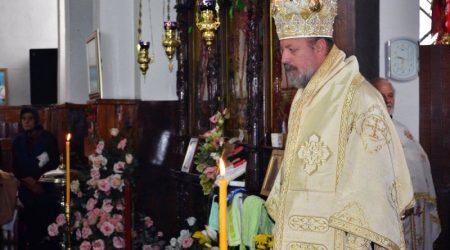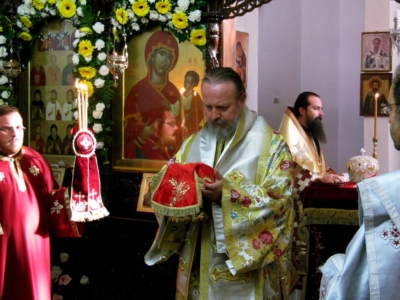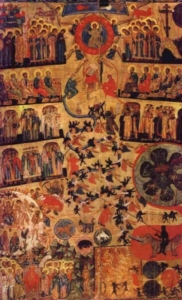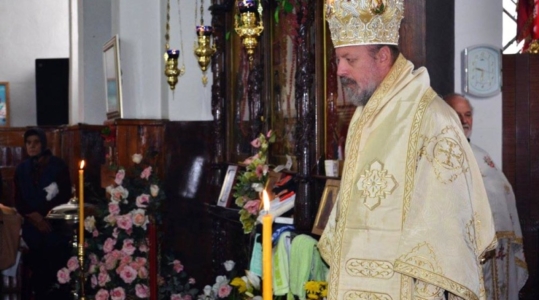
Children, take note, the questions we will have to answer at the Last Judgment do not refer at all to the faith and the Church we belong to, the state, the nation and the party, or our personal sins, but to the concrete personal deeds of charity (ie how merciful we are).
When the Lord Jesus was hungry, did we give Him to eat; When the Lord was thirsty, did we gave Him drink; when the Lord was a stranger, did we take Him in; when the Lord was unclothed, did we clothe him; when the Lord was sick, did we visit Him; did we come to Him when the Lord was in prison? (see Matthew 25: 31-46).
This is the minimum that every Christian who is living in the world needs to fulfil with the hope of salvation.
Why do I say the minimum? According to the Holy Fathers, for two reasons. First, because, for example, the Lord does not ask Christians to heal the sick or liberate the captives, but to visit and console them.
What is easier than that?
And secondly – because, God does not put as a criterion for salvation not doing evil; but, the doing of good.
What’s easier than this?
From the ascetic-hesychastic aspect, the place where we seek the God-Man Christ is our heart, which is captured and defiled by the passions. And since our mind cannot enter the closed heart and reach out to the Son of Man, Christ resides there, lonely, hungry, thirsty, alien, unclothed, in prison …
Therefore, in order to reach out to Christ and to serve Him, first we need to purify our heart from the passions, to recognize the place of the heart, to discover the entrance of the Kingdom of Heaven inside ourselves, and with our own mind to humbly stand before the King of glory, Who is suffering for us and for our salvation.
It is interesting and helpful to know what the meaning of the words “Lord, when did we see you …” is, of those whom the Last Judgment is based on each of the stages of spiritual development, separately.
Those whom the Last Judgment is founded on the stage of purifying the heart from the passions, say the aforementioned words because, despite the struggle to fulfil Christ’s commandments in practice, living in the worries of the world, they did not see the Lord in their hearts through the gift of the ceaseless prayer (prayer of the mind in the heart: Lord Jesus Christ, have mercy on me).
Those that the Last Judgment is founded on the stage of enlightenment of the mind, say the aforementioned words because, despite the struggle of the prayer of the mind in the heart and love for the enemies, most often because of pastoral obligations in the world, they did not see the Lord in their hearts and out, around themselves through the gift of seeing the uncreated light.
Those whom the Last Judgment is founded on the level of deification are saying the aforementioned words because, despite the struggle of the unceasing prayer and the cry for the whole world, because of the abuse of the freedom by those who put themselves on the Christ’s left side, they did not see the Lord in them. Lord, have mercy!
What happens to those whom the Last Judgment finds in sin and fallen?
The fact that the God-Man Christ comes into dialogue with them at all, no matter how horrible it sounds (“go away from me, cursed”) is nothing less, but giving of yet another opportunity for repentance.
And instead of admitting that they deserved the punishment and to seek forgiveness and mercy from the All-Merciful Christ and to be saved at the last moment, they are self-justifying and blaming the Lord even on the Last Judgement: “Lord, when did we see you …”
In summary, all those who during spent their whole life self-justifying and blaming others, what else do they know, but to repeat the same before Christ on the Last Judgment.
Holy Mother of God, save us!
Metropolitan Nahum of Strumica
Matthew 25:31-46
| 31 | When the Son of Man comes in His glory, and all the holy angels with Him, then He will sit on the throne of His glory. |
| 32 | All the nations will be gathered before Him, and He will separate them one from another, as a shepherd divides his sheep from the goats. |
| 33 | And He will set the sheep on His right hand, but the goats on the left. |
| 34 | Then the King will say to those on His right hand, ‘Come, you blessed of My Father, inherit the kingdom prepared for you from the foundation of the world: |
| 35 | ‘for I was hungry and you gave Me food; I was thirsty and you gave Me drink; I was a stranger and you took Me in; |
| 36 | ‘I was naked and you clothed Me; I was sick and you visited Me; I was in prison and you came to Me.’ |
| 37 | Then the righteous will answer Him, saying, ‘Lord, when did we see You hungry and feed You, or thirsty and give You drink? |
| 38 | ‘When did we see You a stranger and take You in, or naked and clothe You? |
| 39 | ‘Or when did we see You sick, or in prison, and come to You?’ |
| 40 | And the King will answer and say to them, ‘Assuredly, I say to you, inasmuch as you did it to one of the least of these My brethren, you did it to Me.’ |
| 41 | Then He will also say to those on the left hand, ‘Depart from Me, you cursed, into the everlasting fire prepared for the devil and his angels: |
| 42 | ‘for I was hungry and you gave Me no food; I was thirsty and you gave Me no drink; |
| 43 | ‘I was a stranger and you did not take Me in, naked and you did not clothe Me, sick and in prison and you did not visit Me.’ |
| 44 | Then they also will answer Him, saying, ‘Lord, when did we see You hungry or thirsty or a stranger or naked or sick or in prison, and did not minister to You?’ |
| 45 | Then He will answer them, saying, ‘Assuredly, I say to you, inasmuch as you did not do it to one of the least of these, you did not do it to Me.’ |
| 46 | And these will go away into everlasting punishment, but the righteous into eternal life. |
Деца, забележувате ли дека прашањата на кои ќе треба да одговориме на Страшниот суд воопшто не се однесуваат на верата и Црквата на кои припаѓаме, ниту на државата, нацијата и партијата, ниту на нашите лични гревови, туку на конкретните лични дела на милосрдие:
дали кога Господ Христос беше гладен Му дадовме да јаде; дали кога Господ беше жеден Му дадовме да пие; дали кога Господ беше странец Го примивме; дали кога Господ беше необлечен Го облековме; дали кога Господ беше болен Го посетивме; дали кога Господ беше во затвор дојдовме при Него? (види: Матеј 25, 31–46).
Ова е минимумот што секој христијанин кој живее во светот треба да го исполни со надеж за спасение.
Зошто велам минимум? Според Светите Отци, од две причини. Прва – затоа што, на пример, Господ не бара од христијаните да ги исцелат болните или да ги ослободат заробените, туку да ги посетат и утешат.
Што полесно од тоа? И втора – затоа што не го става Господ како критериум за спасение нечинењето на злото, туку чинењето на доброто.
Што полесно и од ова?
Од аскетско-исихастички аспект, местото каде што ние Го бараме Богочовекот Христос е нашето срце, заробено и извалкано од страстите. А бидејќи нашиот ум не може да влезе во затвореното срце и да допре до Синот Човечки, Христос престојува таму осамен, гладен, жеден, странец, необлечен, во затвор…
Затоа, за да допреме до Христос и да Му послужиме, најнапред треба да го очистиме своето срце од страстите, да го осознаеме местото на срцето, да го откриеме влезот на Царството Небесно внатре во себе, и со својот ум смирено да застанеме пред Царот на славата, Кој страда заради нас и наше спасение.
Интересно е и полезно да знаете што значат зборовите „Господи, кога Те видовме…“ на оние што Страшниот суд ги затекнува на секој од степените на духовниот развој, поодделно:
Оние што Страшниот суд ги затекна на степенот на чистење на срцето од страстите, ги велат гореспоменатите зборови затоа што и покрај подвигот да ги исполнат Христовите заповеди во пракса, живеејќи во грижите на светот, не Го видоа Господ во своето срце преку дарот на умно-срдечната молитва.
Оние што Страшниот суд ги затекна на степенот на просветлување на умот, ги велат гореспоменатите зборови затоа што и покрај подвигот на умно-срдечната молитва и на љубовта кон непријателите, најчесто поради пастирски обврски во светот, не Го видоа Господ во своето срце и надвор околу себе преку дарот на гледање на несоздадената светлина.
Оние што Страшниот суд ги затекна на степенот на обожение, ги велат гореспоменатите зборови затоа што и покрај подвигот на непрестајната молитва и на плачот за целиот свет, поради злоупотребата на слободата од страна на оние што самите себе се ставија на левата страна, не Го видоа Господ и во нив. Господи, помилуј!
Што се случува со оние кои Страшниот суд ги затекнува во грев и пад?
Тоа што Богочовекот Христос воопшто стапува во дијалог со нив, колку и да звучи тоа страшно („одете од Мене, проклети“), не е ништо друго освен давање на уште една можност за покајание.
И наместо да признаат дека ја заслужиле казната и да побараат прошка и милост од Семилостивиот Христос и да се спасат во последен момент, тие се самооправдуваат и Го обвинуваат Господ и на самиот Страшен суд: „Господи, кога Те видовме…“
Со еден збор, сите оние што во текот на целиот свој живот се самооправдуваа и ги обвинуваа другите, што друго знаат освен и пред Христос на Страшниот суд истото тоа да го повторат.
Пресвета Богородице, спаси не!
Митрополит Струмички Наум




